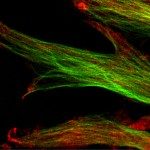Lien vers Pubmed [PMID] – 28369675
Curr Protoc Mol Biol 2017 Apr;118:20.12.1-20.12.24
The bacterial two-hybrid (BACTH, for “Bacterial Adenylate Cyclase-based Two-Hybrid”) technique is a simple and fast genetic approach to analyze protein-protein interactions in vivo. In this system, the proteins of interest are genetically fused to two complementary fragments from the catalytic domain of Bordetella pertussis adenylate cyclase and co-expressed in strains of Escherichia coli deficient in adenylate cyclase. Association of the hybrid proteins restores synthesis of cyclic AMP (cAMP), which then triggers the expression of catabolic operons such as the lactose operon or the maltose regulon. As BACTH uses a cAMP second messenger, the association between the chimeric proteins can take place at a distance from the transcription machinery. This technique is therefore particularly appropriate for studying interactions involving integral-membrane or membrane-associated proteins that may not be soluble in the cytoplasm, and/or that may only associate in the plane of the membrane. This unit describes the basic procedures to characterize protein-protein interactions with the BACTH genetic system and to search for potential partners of known proteins. © 2017 by John Wiley & Sons, Inc.



